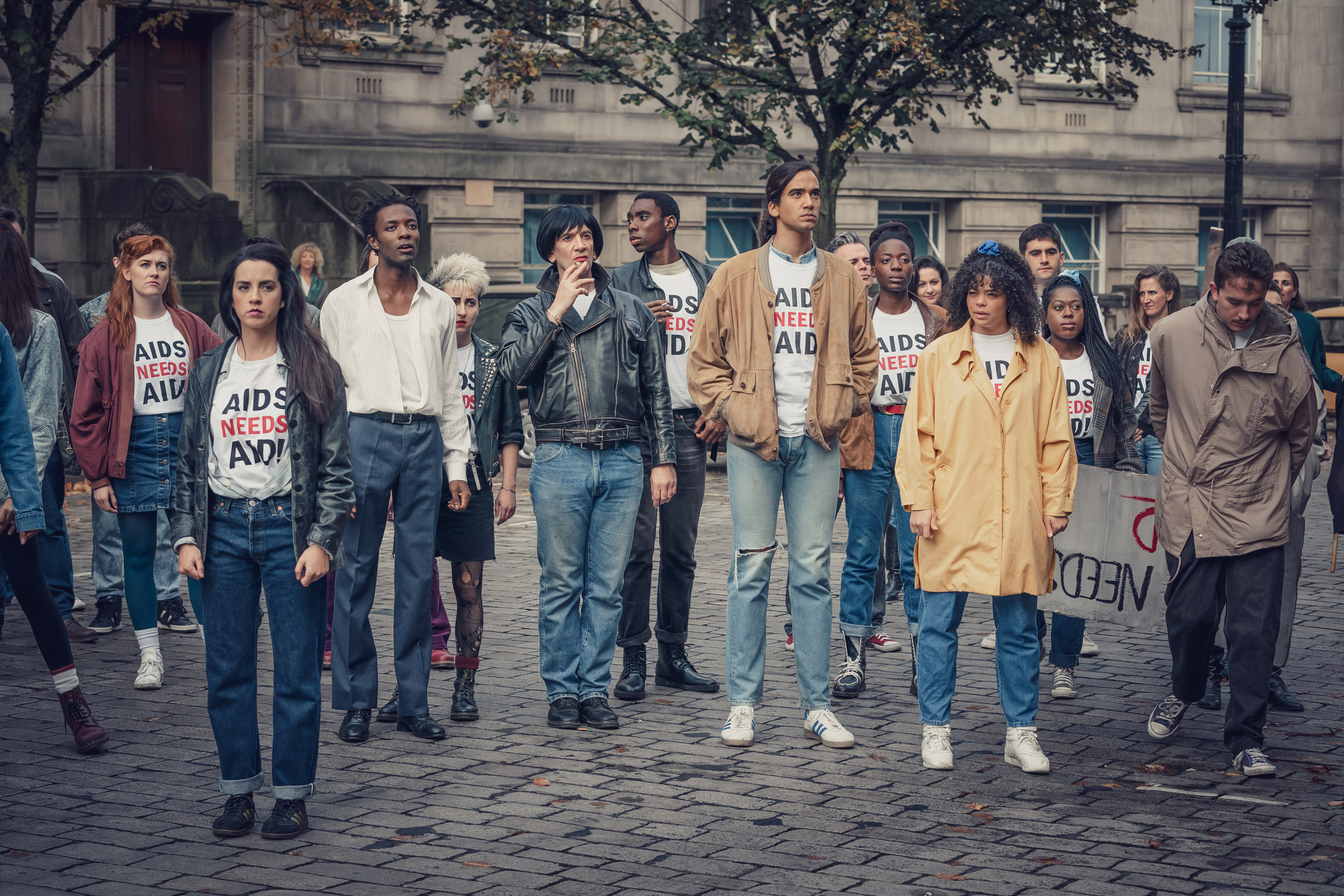Gutsier than The Inheritance, gentler than Angels in America, younger than The Normal Heart, crueler than Falsettos, yet more hopeful than 1985: It’s A Sin is a revolutionary depiction of the 1980s HIV/AIDS epidemic.
The historical mini-series created by Russel T. Davies (Doctor Who, Queer As Folk) centres on a group of young people living in Thatcher-era London. Set between 1981 and 1991, the show follows actor-to-be Ritchie Tozer (Olly Alexander), first-generation immigrant Roscoe Babatunde (Omari Douglas), and Welsh-accented wallflower Colin Morris-Jones (Callum Scott Howells) as they delve into the city’s nightlife. By the end of the pilot episode, all three characters end up sharing a flat dubbed the “Pink Palace,” with Ritchie’s sweet-hearted classmate, Jill Baxter (Lydia West), and his friend-with-benefits, Ash Mukherjee (Nathaniel Curtis).
Davies explores his characters with such nuance and care—combining fumbling anxiety and insecurity, intense rage and liberated desire, inexperience and limitless ambition—that each one becomes deeply relatable. We can recognize traces of these young people in our classmates, family, friends, and even in ourselves.
But as these young men develop their careers, switch college majors, and party through London’s bustling queer nightlife, the audience knows what they do not—that the shadow of HIV/AIDS hangs over their lives. Colin, who struggles most of all to find a sense of community, seeks the mentorship of an older gay coworker, Henry Coltrane (Neil Patrick Harris), only to see him disappear from work soon after. Colin finds Henry weeks later, forcefully separated from his partner, and locked in an isolated hospital room unexpectedly diagnosed with lung cancer. Simultaneously, Roscoe is hired as a club manager tasked with kicking out older gay men for distributing information pamphlets about “GRID” (Gay-Related Immune Deficiency)—an early term for HIV/AIDS.
Aside from its unprecedented U.K.-centric focus, It’s A Sin is a unique addition to AIDS-era media for its exploration of mass confusion and miscommunication-fueled fear. For such a tragic topic, Ritchie makes for an unusual protagonist as a brazen party-boy. Flitting from pub to pub, Ritchie is seen mocking the notion of a disease that only kills gay men. He disputes his friends, cheekily laughing at a disease that can supposedly calculate someone’s sexuality or target H-named demographics (Haitians, Homosexuals, Hemophiliacs).
The monologue ends with Ritchie, arms open and about to kiss a random club-goer, yelling to the camera, “How do I know [AIDS] is not true? I’m not stupid!”
Months later while Ritchie is out partying, his friend Gregory dies alone in his apartment.
While most contemporary queer storylines continue to be dominated by gay white men, the show masterfully incoporates an intersectional analysis of systemic oppression. Through Roscoe’s character, a first-generation Nigerian-British gay man, the show explores queerness in immigrant households and touches on issues of racism and classism. At one point, Roscoe works as an escort for the racist and elitist Tory MP Arthur Garrison (Stephen Fry). The power imbalance between the two begs the question as to why Black, Indigenous and people of colour within the queer community have to work harder to obtain a smidge of the wealth and power afforded to straight-passing white aristocrats.
Although the show is not wholly perfect—and there is something to be said about the underdevelopment of Jill’s character and the exclusion of queer women who helped in the fight for HIV/AIDS research—it is, overall, a tour de force. Timely in its release during our own pandemic and magnificent in execution, the magic of It’s A Sin lies in its humanity; never are the characters given the relief of being political heroes or melodramatic martyrs. Without romanticizing their death, it insists on remembering them—and the people they represent—for the friendships they fostered, the fun they had, and above all, the love they shared, even if only for a moment.








